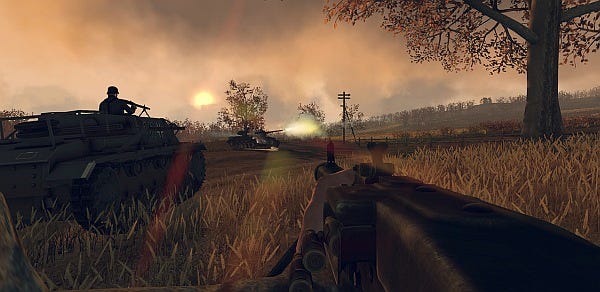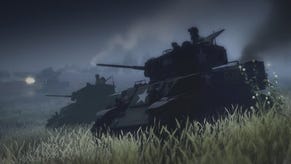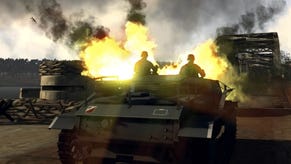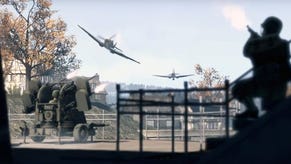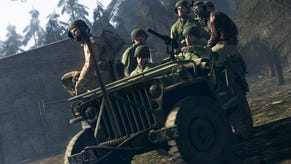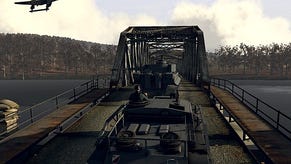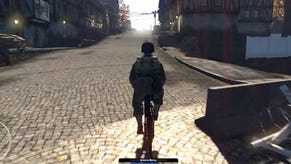Interview: Reto-Moto On Heroes & Generals
Exclusive!
Here, before your eyes, is the world's first interview (if you ignore a Danish one from a few years ago) with the Hitman creators' re-formed Reto-Moto, in which they discuss their recently re-announced game, Heroes & Generals. I'll admit that seeing the in-game alpha footage yesterday, I sighed at what looked like yet another WW2 FPS. But I've since learned that the game is a lot more than that. It's a persistent, massively multiplayed game, combining traditional on-ground soldier FPS battles with strategic resource and equipment management from the tents. To find out just how that works, I spoke to Jacob Andersen, game director for Reto (and original artist on all the previous Hitman games). He talks about the game's persistent world, how the strategic elements of the General roles work, and what lessons have been learned from their days at IO.
There's a lot more to this game than the first footage implies. While it's certainly not the first attempt to combine FPS play with an MMO framework, it does seem strikingly original in its attempts to add a strategic element. And this, despite only just having crossed the media's radar, is a game being developed rather openly. In fact, if you're interested in getting into the early alpha, you can apply over here. But without playing, what's happening here needs further explanation, thus the following interview:
RPS: It's been a while since you guys left IO. What have you been up to in all those years?
Jacob Andersen: Well, first of all we had to sit out a non-compete clause period, where we were not allowed to work on games. And then we had to raise funds for Heroes & Generals, which definitely isn't easy in a small country like Denmark in the middle of a financial crisis.
RPS: So we misunderstood Heroes & Generals to be an FPS, when in fact it's a persistent online world. Can you tell us just how wrong we are, and exactly what sort of game it will be?
Jacob Andersen: You are not that wrong. A big part of the game is an FPS but it ties into a persistent game world. The basic idea is that, while FPS games are fun, we felt that we would like to try and add the feeling of being part of a greater scenario known from MMOs. So we came up with the idea of having a grander persistent online war represented by a number of armies, or Assault Teams as we call them, on a strategic world map campaign and then let the actual clashes between the Assault Teams be played out as FPS-battles.
RPS: Can you go into a bit more detail about the two types of play? The soldiers on the ground, and the bosses upstairs. How will that work?
Jacob Andersen: The FPS part is a straightforward team based shooter and you can play it like that if you don't want your gaming experience to be too complex. The strategy part of the game feeds resources into the action game (men, tanks, planes, etc.) which makes this part a lot about the logistics of war. Having the right equipment at the right place at the right time. I would not call it a 'strategy game' but rather strategic management of action games (if that makes any sense). The action game consumes resources (men, tanks, planes etc.) and a team will loose a battle if they are poorly managed. The actual management part is somewhat 'upside down' of what you would traditionally have. Players does not grind to get to a certain commander rank but are put there by other players assigning their units under his command. This way the players are, in principle, free to organize their army the way they like. I guess we would probably see various factions on each side (Axis or Allies) as we don't expect all players to be able to agree, but obviously the team that knows how to organize themselves will have a clear advantage over a team ruled by chaos.
RPS: You've said that one player can affect the entire game. How will that happen for players?
Jacob Andersen: When you fight on the ground it actually matters if you win or loose a map. One player can blow up a bridge that will stop enemy supplies reaching other battles going on, or you can drop down behind enemy lines and retrieve intel about enemy positions, helping the players decide what to do next on the higher strategic level. The idea is that instead of playing to increase your XP you are playing because every time you shoot an enemy they loose a solider. It all counts in the end.
RPS: So, when playing as a soldier, how aware will I be of the actions of Generals above me? Will I be able to just boot up and play it as an FPS, and can I still be involved in those strategic decisions?
Jacob Andersen: You can always just boot up and join a battle. If your team is loosing or in need of assistance you can request reinforcements from your commander (extra lives/tanks etc.) And if he is good at managing his reserves he will be able to give it to you. But it's important to notice that you don't have to choose to play the game as either commander or soldier - you can do both.
RPS: When playing as a General, how involved will I be during the ground combat? Is my role complete at that point?
Jacob Andersen: As a General you will be able to communicate with the guys on the ground, but because you have the ability to play at both levels my guess is that most players will actually join the combat too.
RPS: You'll probably understand people's initial reaction to "another WW2 game". It's a theme that's been explored an awful lot, and recently the trend has been to set games in the present or near future. What is it about WW2 that you think is left unexplored, and worth returning to?
Jacob Andersen: Well, I could say the same thing about modern warfare games... We've seen an awful lot of those the past years, and yet people still find them exciting. I have a feeling that most of this comes mainly from the gaming industry and not really from the gamers. The WW2 scenario is very well known so it doesn't need a lot of explanation which means that we can focus on the gameplay instead of telling stories.
RPS: What lessons from your IO days have you brought into the development of H&G?
Jacob Andersen: Well, this game is quite different from what we've developed before, so we have had to learn quite a few new things. Obviously we've developed game engines before and this experience have been very useful when we had to start all over with our new Retox engine. Our experience with developing stealth games such as Hitman makes it natural for us to also think in terms of stealth and disguise game modes - but that's a bit out in the future. We'll start by making traditional multiplayer game modes, and later we'll introduce more advanced ones.
RPS: Any idea when we might be able to get our hands on the game?
Jacob Andersen: We have started getting people in to play an early alpha version of the game, to test the server structure and basic gameplay mechanics and to get feedback from the gamers who in the end are going to buy and play the game. We're used to develop games behind closed doors and not telling or showing anyone what we do - but this time we want to do things differently. We believe that it's important to involve the gamers at an early stage instead of waiting to get feedback until after launch. There is so much power and great ideas among the gamers out there, so we would really like to tap into that resource and make those great ideas into a great game.
RPS: Thanks for your time.
Oh, and have a teaser:
